![[:it]Insieme per l’Europa: l’unità è possibile[:de]Einheit ist möglich![:es]Juntos por Europa: la unidad es posible[:fr]Ensemble pour l’Europe : L’unité est possible[:pt]Juntos pela Europa: A unidade é possível](https://www.focolare.org/wp-content/uploads/2016/07/20160701_161752_9438MfE_Fr_Podium5_FotoFischer-e1467623076552.jpg)
Jul 3, 2016 | Focolare Worldwide
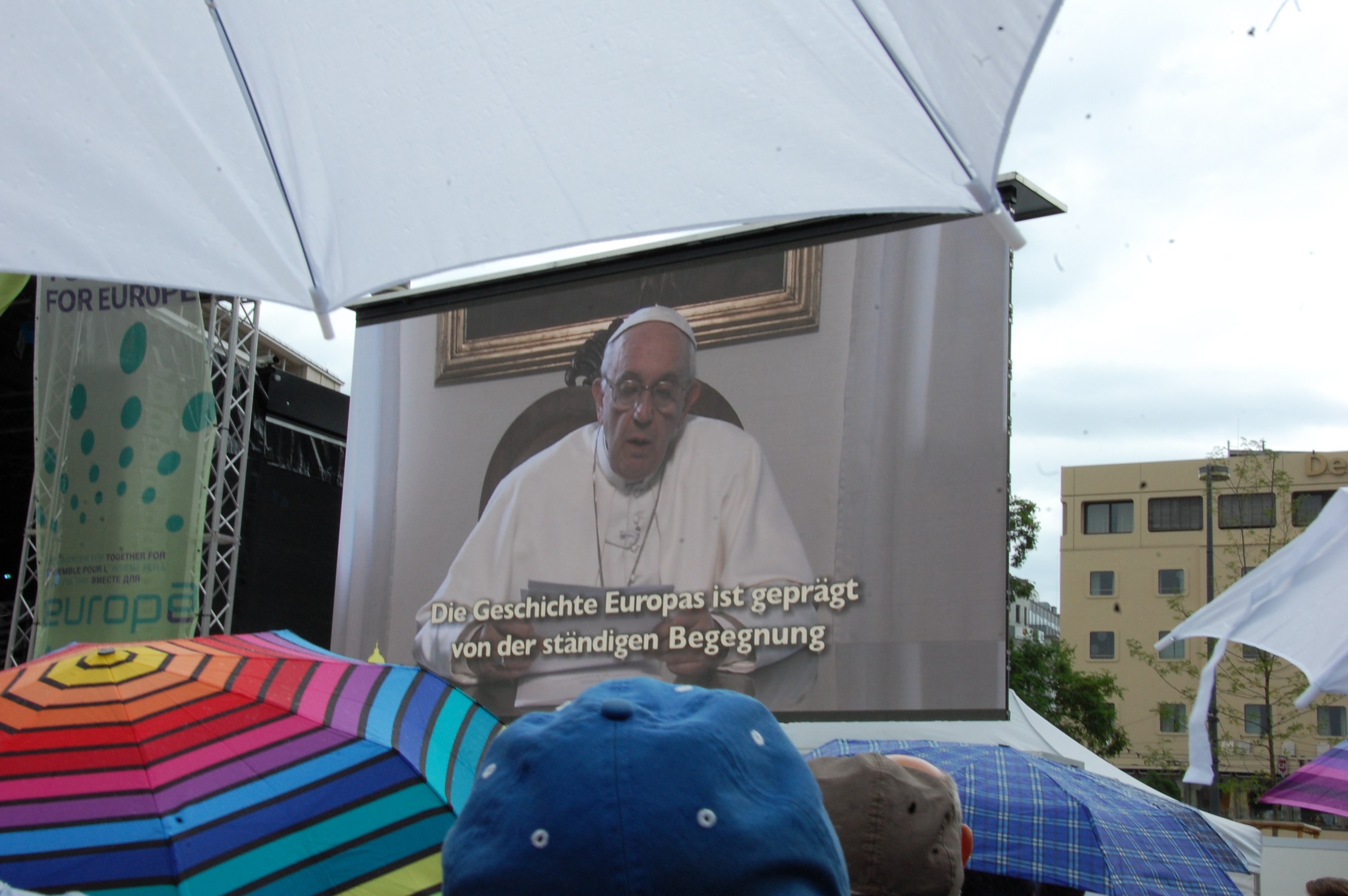
(c) MfE, Foto: Brehm
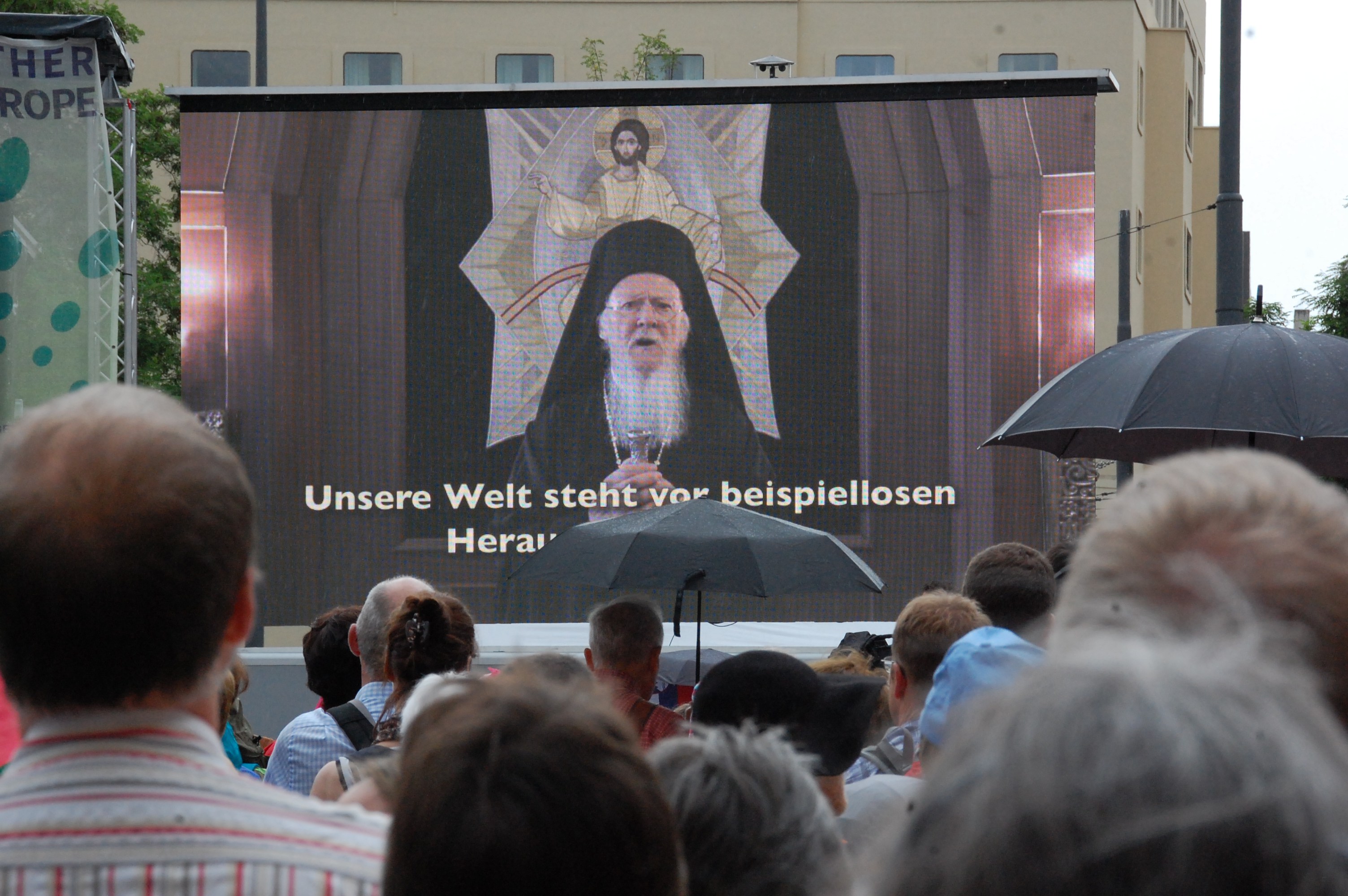
(c) MfE, Foto: Brehm
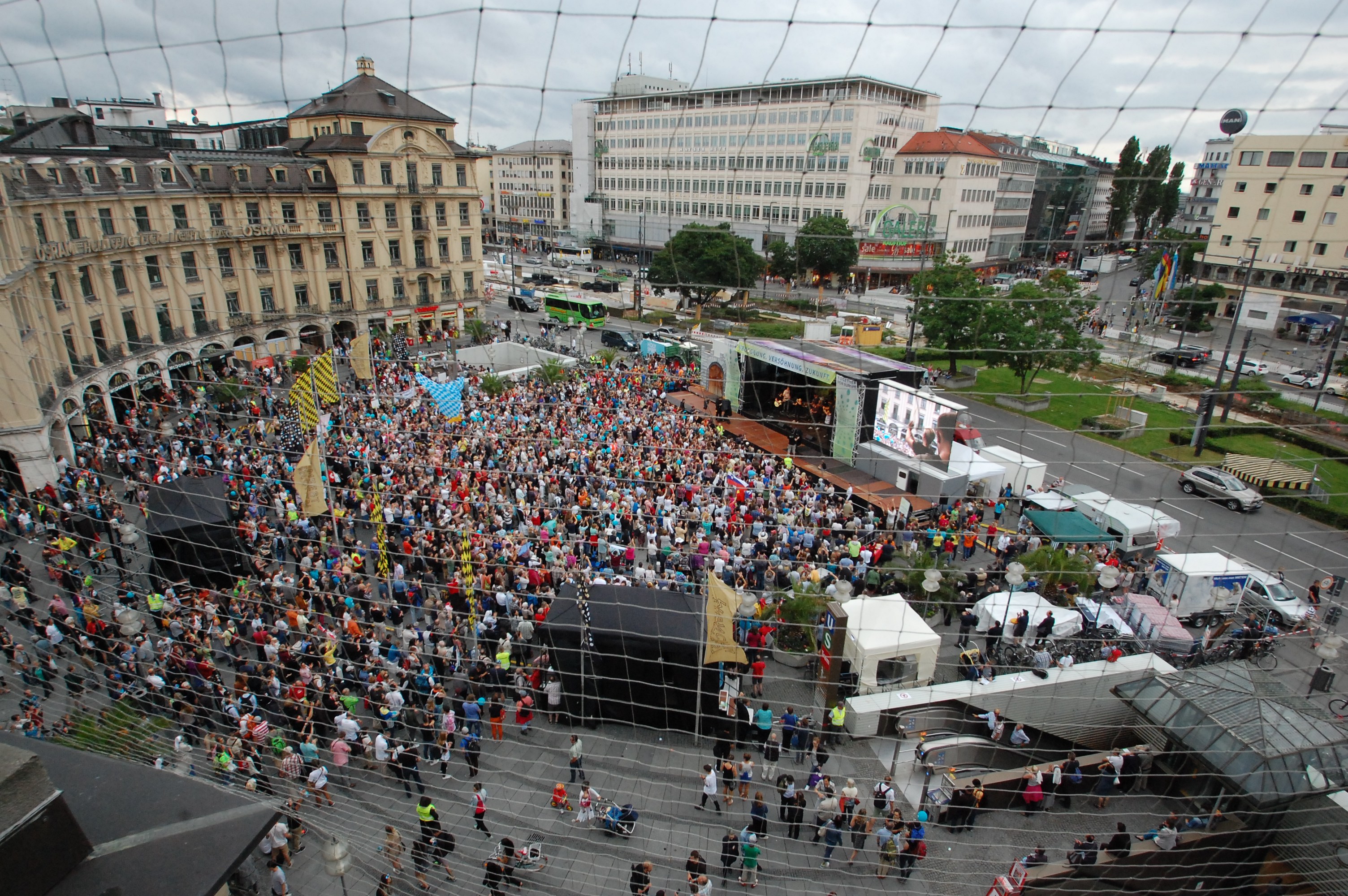
(c) MfE, Foto: Brehm
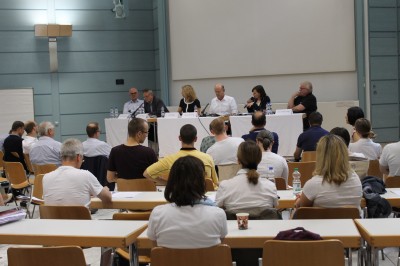
(c) MfE, Foto: Fischer
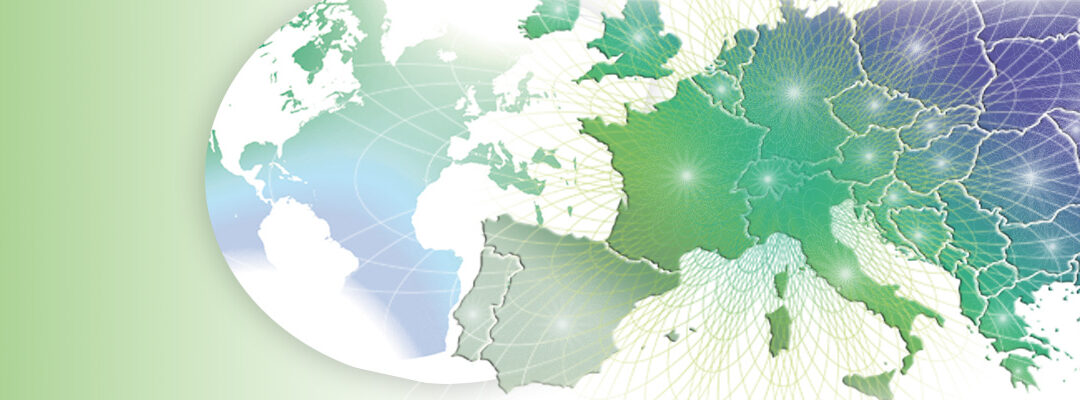
Jul 2, 2016 | Non categorizzato
Together for Europe Encounter, Reconciliation, Future Munich (Bavaria), 2nd July 2016  There is no alternative to being together “United in diversity”. This European hope is more than ever relevant. Europe must not become a fortress and build new frontiers. There is no alternative to being together. Being together in reconciled diversity is possible. The Gospel – a source of hope Jesus Christ prayed for unity and gave his life for it. This is stated in the Gospel, which for almost 2,000 years has played a key role in the culture of Europe. Jesus Christ teaches us boundless love for all people. He shows us the path of mercy and reconciliation. We can ask forgiveness and forgive one another. The Gospel of Jesus Christ is a powerful source from which we can draw hope for the future. Europe – a culture of respect and esteem The terrible experiences of two World Wars have taught us that peace is a precious gift that we must preserve. Our future must be characterised by a culture of respect and esteem for others, even for strangers. Unity is possible – Overcoming divisions We ask all Christians, especially Church leaders, to overcome the divisions. These have caused suffering, violence and injustice, and have undermined the credibility of the Gospel. As Christians we want to live together as people who are reconciled and in full communion. Our commitment We live the Gospel of Jesus Christ and bear witness to it with our words and deeds. We are pursuing the path of reconciliation and working to enable our communities, Churches, peoples and cultures to live “unity in diversity”. We meet people of different beliefs and faiths with respect, seeking dialogue with them. We are committed to building up humanity and peace in the world. We have a vision for Europe being together in a way that is stronger than fear or selfishness. We place our trust in the Holy Spirit who continually renews and gives life to the world Concluding Message – Together For Europe, Munich 2016
There is no alternative to being together “United in diversity”. This European hope is more than ever relevant. Europe must not become a fortress and build new frontiers. There is no alternative to being together. Being together in reconciled diversity is possible. The Gospel – a source of hope Jesus Christ prayed for unity and gave his life for it. This is stated in the Gospel, which for almost 2,000 years has played a key role in the culture of Europe. Jesus Christ teaches us boundless love for all people. He shows us the path of mercy and reconciliation. We can ask forgiveness and forgive one another. The Gospel of Jesus Christ is a powerful source from which we can draw hope for the future. Europe – a culture of respect and esteem The terrible experiences of two World Wars have taught us that peace is a precious gift that we must preserve. Our future must be characterised by a culture of respect and esteem for others, even for strangers. Unity is possible – Overcoming divisions We ask all Christians, especially Church leaders, to overcome the divisions. These have caused suffering, violence and injustice, and have undermined the credibility of the Gospel. As Christians we want to live together as people who are reconciled and in full communion. Our commitment We live the Gospel of Jesus Christ and bear witness to it with our words and deeds. We are pursuing the path of reconciliation and working to enable our communities, Churches, peoples and cultures to live “unity in diversity”. We meet people of different beliefs and faiths with respect, seeking dialogue with them. We are committed to building up humanity and peace in the world. We have a vision for Europe being together in a way that is stronger than fear or selfishness. We place our trust in the Holy Spirit who continually renews and gives life to the world Concluding Message – Together For Europe, Munich 2016
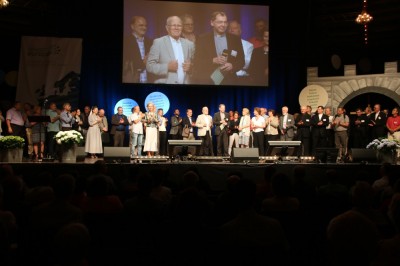
Jul 2, 2016 | Focolare Worldwide
 What are the challenges for Europe today? What about social and political responsiblity toward the other continents? What contribution can Christian movements make? There were many questions at the beginning of the second day of the Congress that focused on the current situation of the European continent with its local and global challenges. “We have to move on from the Europe of the fathers and make [the Europe] of the sons [and the daughters],” exhorted president of the Community of Sant’Egidio, Marco Impagliazzo. “Christians have to re-choose Europe together; we can’t do it alone. Europe can’t live for itself; it should live its Christianity in favour of the others and with the others. Now is the time for ‘spiritual humanism’ and for the life of the Churches and communities to emerge and bring their own contribution.” Gérard Testard from EFESIA in Paris accented the need for Christian action in the public sphere. We shouldn’t have heavenly citizenship on one side and earthly citizenship on the other. They need to exist together. Michael Hochschild, sociologist and professor of post-modern thought at Time-Lab of Paris, underscored the socio-political importance of spiritual Communities and Movements in Europe. But for this to be so, he said, “you need to consider yourselves and show yourselves to be a decisive force for shaping the cultural landscape.” “You need to become socio-civil Movements.” He also said that in a time of uncertainty and lack of vision, Communities like those involved in Together4Europe offer alternative models for living. “It could be the fear of the future that constrains us to do all we can so that [future] might be better,” stated Herbert Lauenroth, expert on interculturalism at the Ecumenical Centre of Ottmaring, Germany. According to his analysis the current situation in Europe arises from a reaction to fear and uncertainty that is the result of a sense of existential suffocation. Such a situation represents a challenge with the passage of time: The fear could become a learning experience. “It’s a matter of preferring what is unknown, foreign, what lies at the extreme, as a place in which to learn the faith.” Through confrontation with the depths that society is facing, we can come to realize that a new direction based on faith is possible.” “Europe is passing through the night of its values, the night of its role in the world, the night of its dreams,” Focolare president Maria Voce affirmed in her intervention. “Together4Europe seems to be precisely the entity that would be capable of inspiring individuals and associations in their efforts for a Europe that is free, reconciled, democratic, supportive and fraternal, a Europe that could be a gift to the rest of the world.” “Steffen Kern from the Evangelical Federation of Wuerttemberg, continued the reflection on Europe and Hope: “Where do we Christians place our hope? A sense of responsibility is needed and taking on the pains and shadows of our cities. In Stuttgart we opened the House of Hope that welcomes women and others who are alone to show them that God never abandons anyone.” Thomas Roemer from the YMCA in Munich made it clear that if we don’t substitute the Europe of fear with the Europe of hope, the latter risks dying off. Like the disciples, Europe is also on a boat with Jesus. “Jesus is still here in the storms; we need to have faith. He got on the boat to save us.” In the afternoon, Together for Europe opened its doors to anyone who wished to join the discussion on confronting and planning. At the roundtable on “Christians and Muslims in Dialogue” the need to know one another emerged, to meet and work together on social and cultural challenges. Pasquale Ferrara, Italian neo-ambassador to Algeria, underscored the fact that dialogue is not done by cultures or religions, but by human beings. We all need to take a bath in concreteness and realism. Imam Baztami invited everyone to an encounter with others, to get to know others. Many ideas and projects emerged from the debate between Religions philosopher Beate Beckmann-Zoeller, Dr. Thomas Amberg from the Evangelical Church and French Bishop M. Dubost. At the “Towards Sustainablity in Europe” roundtable, Cardinal Turkson, environmental engineer Daniele Renzi, Hans-Hermann Böhm and other experts took up the Pope’s invitation for serious and open debate on climate change and ecological challenges. “Science and religion should be in dialogue,” Turkson remarked, “so they can make a common contribution to society.” The roundtable on “The Mysticism of Encounter” put Europeans from the left in dialogue with theologians and philosophers from Christian Movements. “Regarding the ultimate questions of meaning, we’re closer to one another than we think,” said Walter Baier, member of the Austrian Communist Party and coordinator of the “Transform! Europe” Network. Focolare co-president Jesús Moran supported a new and inclusive form of integration for people with no religious affiliation. He concluded: “The harmony amongst us here today is a reason for much hope.” The President of the Council for the Promotion of Christian Unity, Cardinal Kurt Koch, spoke about encounter, reconciliation and future, three words used in the main title of the event. “It is God who has taken the first step towards us.” “And you can forgive only when you acknowledge the wrong; for this reason the negative is hard work for the heart.” Therefore Christian Movements are “called to be missionaries of reconciliation, beginning from prayer that is then translated into daily life.” Source: www.together4europe.org
What are the challenges for Europe today? What about social and political responsiblity toward the other continents? What contribution can Christian movements make? There were many questions at the beginning of the second day of the Congress that focused on the current situation of the European continent with its local and global challenges. “We have to move on from the Europe of the fathers and make [the Europe] of the sons [and the daughters],” exhorted president of the Community of Sant’Egidio, Marco Impagliazzo. “Christians have to re-choose Europe together; we can’t do it alone. Europe can’t live for itself; it should live its Christianity in favour of the others and with the others. Now is the time for ‘spiritual humanism’ and for the life of the Churches and communities to emerge and bring their own contribution.” Gérard Testard from EFESIA in Paris accented the need for Christian action in the public sphere. We shouldn’t have heavenly citizenship on one side and earthly citizenship on the other. They need to exist together. Michael Hochschild, sociologist and professor of post-modern thought at Time-Lab of Paris, underscored the socio-political importance of spiritual Communities and Movements in Europe. But for this to be so, he said, “you need to consider yourselves and show yourselves to be a decisive force for shaping the cultural landscape.” “You need to become socio-civil Movements.” He also said that in a time of uncertainty and lack of vision, Communities like those involved in Together4Europe offer alternative models for living. “It could be the fear of the future that constrains us to do all we can so that [future] might be better,” stated Herbert Lauenroth, expert on interculturalism at the Ecumenical Centre of Ottmaring, Germany. According to his analysis the current situation in Europe arises from a reaction to fear and uncertainty that is the result of a sense of existential suffocation. Such a situation represents a challenge with the passage of time: The fear could become a learning experience. “It’s a matter of preferring what is unknown, foreign, what lies at the extreme, as a place in which to learn the faith.” Through confrontation with the depths that society is facing, we can come to realize that a new direction based on faith is possible.” “Europe is passing through the night of its values, the night of its role in the world, the night of its dreams,” Focolare president Maria Voce affirmed in her intervention. “Together4Europe seems to be precisely the entity that would be capable of inspiring individuals and associations in their efforts for a Europe that is free, reconciled, democratic, supportive and fraternal, a Europe that could be a gift to the rest of the world.” “Steffen Kern from the Evangelical Federation of Wuerttemberg, continued the reflection on Europe and Hope: “Where do we Christians place our hope? A sense of responsibility is needed and taking on the pains and shadows of our cities. In Stuttgart we opened the House of Hope that welcomes women and others who are alone to show them that God never abandons anyone.” Thomas Roemer from the YMCA in Munich made it clear that if we don’t substitute the Europe of fear with the Europe of hope, the latter risks dying off. Like the disciples, Europe is also on a boat with Jesus. “Jesus is still here in the storms; we need to have faith. He got on the boat to save us.” In the afternoon, Together for Europe opened its doors to anyone who wished to join the discussion on confronting and planning. At the roundtable on “Christians and Muslims in Dialogue” the need to know one another emerged, to meet and work together on social and cultural challenges. Pasquale Ferrara, Italian neo-ambassador to Algeria, underscored the fact that dialogue is not done by cultures or religions, but by human beings. We all need to take a bath in concreteness and realism. Imam Baztami invited everyone to an encounter with others, to get to know others. Many ideas and projects emerged from the debate between Religions philosopher Beate Beckmann-Zoeller, Dr. Thomas Amberg from the Evangelical Church and French Bishop M. Dubost. At the “Towards Sustainablity in Europe” roundtable, Cardinal Turkson, environmental engineer Daniele Renzi, Hans-Hermann Böhm and other experts took up the Pope’s invitation for serious and open debate on climate change and ecological challenges. “Science and religion should be in dialogue,” Turkson remarked, “so they can make a common contribution to society.” The roundtable on “The Mysticism of Encounter” put Europeans from the left in dialogue with theologians and philosophers from Christian Movements. “Regarding the ultimate questions of meaning, we’re closer to one another than we think,” said Walter Baier, member of the Austrian Communist Party and coordinator of the “Transform! Europe” Network. Focolare co-president Jesús Moran supported a new and inclusive form of integration for people with no religious affiliation. He concluded: “The harmony amongst us here today is a reason for much hope.” The President of the Council for the Promotion of Christian Unity, Cardinal Kurt Koch, spoke about encounter, reconciliation and future, three words used in the main title of the event. “It is God who has taken the first step towards us.” “And you can forgive only when you acknowledge the wrong; for this reason the negative is hard work for the heart.” Therefore Christian Movements are “called to be missionaries of reconciliation, beginning from prayer that is then translated into daily life.” Source: www.together4europe.org
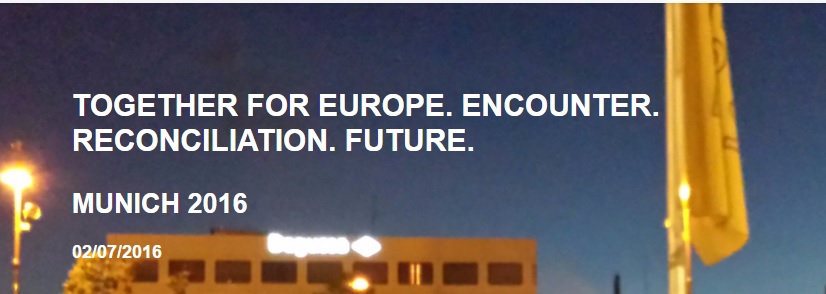
Jul 2, 2016 | Non categorizzato

Streaming in German, English, French, Italian, Portuguese, Spanish and Hungarian. After 6 PM streaming only in the original language until 10 PM.
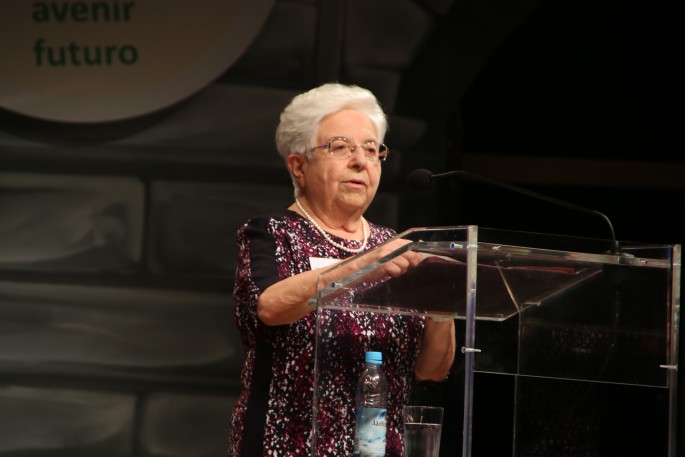
Jul 1, 2016 | Focolare Worldwide
 «It is paradoxical that the new Europe, which arose out of the demolition of the Berlin Wall, should be tempted, through fear, to shut itself behind new fences, building new walls and fences, in the illusion of being able to stop history that is once again knocking at its doors. The single currency project was supposed to be a big new step towards political union, a great new identifying moment in which solidarity and the sharing of sovereignty, in order to achieve common objectives, were to represent the fundamental pillars. Actually two examples show us how little this has been achieved. On the one hand, the serious delays and heated debates that followed the Greek debt crisis, which greatly undermined the foundations of solidarity among the member states, even leading to speculation on Greece leaving the Euro. On the other hand there is the Brexit issue and other separatist tendencies which also test solidarity severely. Because going out of the Union is not like leaving a club, but is equivalent to, and much more like, abandoning partners with whom we no longer share the same reason for being together: the founding pact. Europe is going through the dark night of its own principles, the dark night of its dreams. In reality, a great sense of disorientation reigns in our continent because of the presence of three simultaneous crises: an unprecedented migratory crisis, together with a deep economic crisis, against the backdrop of a demographic crisis. While leaving it to others to analyse the reasons for these crises, I believe that the deeper causes of Europe’s weakness today can be found in the denial of God and of the transcendent. This is a result of the gradual emergence and spread of secular culture which wants to do away with any link with the supernatural. In the search for total freedom, Europe no longer recognizes that its culture was formed through 2,000 years of Christian tradition. Denying this means cutting its own roots and finding itself like a lifeless tree. So is everything collapsing then? Is the continent’s dream of unity being shattered? No. We are here together, as Christian movements and communities in Europe, because we believe there is something that does not collapse. It is love; God who is Love. Our movements are bearers of charisms which are certainly very different from each other and yet all are the work of the Holy Spirit. But the Holy Spirit is precisely the one who creates fraternity (so to speak) among the Persons of the Trinity and who unites all Christians. So the idea of fraternity originates in Heaven and is the purpose of life on earth. All of us can bear witness that we met Christ one day and let ourselves be fascinated and drawn into his Gospel. Living his words led us to change ourselves and reach out to others, building relationships of gospel love and thereby creating communities that become leaven wherever they are. We have discovered a new willingness to be open to all, crossing the boundaries between Churches, between religions, between ethnicities and cultures, in a 360-degree dialogue, until we rediscover everyone as our brothers and sisters. In this way we have found the root of our European culture once more and, on this foundation, we have tried to interpret our present times, which concern the entire planet and all humankind as never before, from the perspective of moving towards a united world. In fact, applying the ideals of peace, justice, freedom and equality today means having a universal dimension, which fraternity makes possible (read the full text)».
«It is paradoxical that the new Europe, which arose out of the demolition of the Berlin Wall, should be tempted, through fear, to shut itself behind new fences, building new walls and fences, in the illusion of being able to stop history that is once again knocking at its doors. The single currency project was supposed to be a big new step towards political union, a great new identifying moment in which solidarity and the sharing of sovereignty, in order to achieve common objectives, were to represent the fundamental pillars. Actually two examples show us how little this has been achieved. On the one hand, the serious delays and heated debates that followed the Greek debt crisis, which greatly undermined the foundations of solidarity among the member states, even leading to speculation on Greece leaving the Euro. On the other hand there is the Brexit issue and other separatist tendencies which also test solidarity severely. Because going out of the Union is not like leaving a club, but is equivalent to, and much more like, abandoning partners with whom we no longer share the same reason for being together: the founding pact. Europe is going through the dark night of its own principles, the dark night of its dreams. In reality, a great sense of disorientation reigns in our continent because of the presence of three simultaneous crises: an unprecedented migratory crisis, together with a deep economic crisis, against the backdrop of a demographic crisis. While leaving it to others to analyse the reasons for these crises, I believe that the deeper causes of Europe’s weakness today can be found in the denial of God and of the transcendent. This is a result of the gradual emergence and spread of secular culture which wants to do away with any link with the supernatural. In the search for total freedom, Europe no longer recognizes that its culture was formed through 2,000 years of Christian tradition. Denying this means cutting its own roots and finding itself like a lifeless tree. So is everything collapsing then? Is the continent’s dream of unity being shattered? No. We are here together, as Christian movements and communities in Europe, because we believe there is something that does not collapse. It is love; God who is Love. Our movements are bearers of charisms which are certainly very different from each other and yet all are the work of the Holy Spirit. But the Holy Spirit is precisely the one who creates fraternity (so to speak) among the Persons of the Trinity and who unites all Christians. So the idea of fraternity originates in Heaven and is the purpose of life on earth. All of us can bear witness that we met Christ one day and let ourselves be fascinated and drawn into his Gospel. Living his words led us to change ourselves and reach out to others, building relationships of gospel love and thereby creating communities that become leaven wherever they are. We have discovered a new willingness to be open to all, crossing the boundaries between Churches, between religions, between ethnicities and cultures, in a 360-degree dialogue, until we rediscover everyone as our brothers and sisters. In this way we have found the root of our European culture once more and, on this foundation, we have tried to interpret our present times, which concern the entire planet and all humankind as never before, from the perspective of moving towards a united world. In fact, applying the ideals of peace, justice, freedom and equality today means having a universal dimension, which fraternity makes possible (read the full text)».
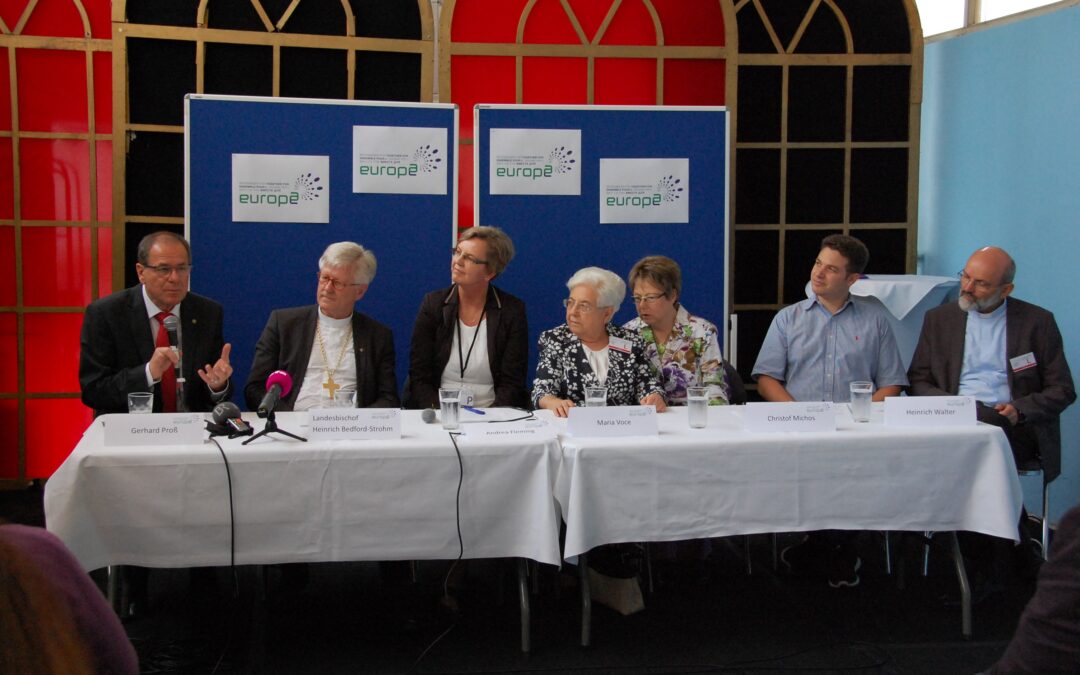
Jul 1, 2016 | Focolare Worldwide
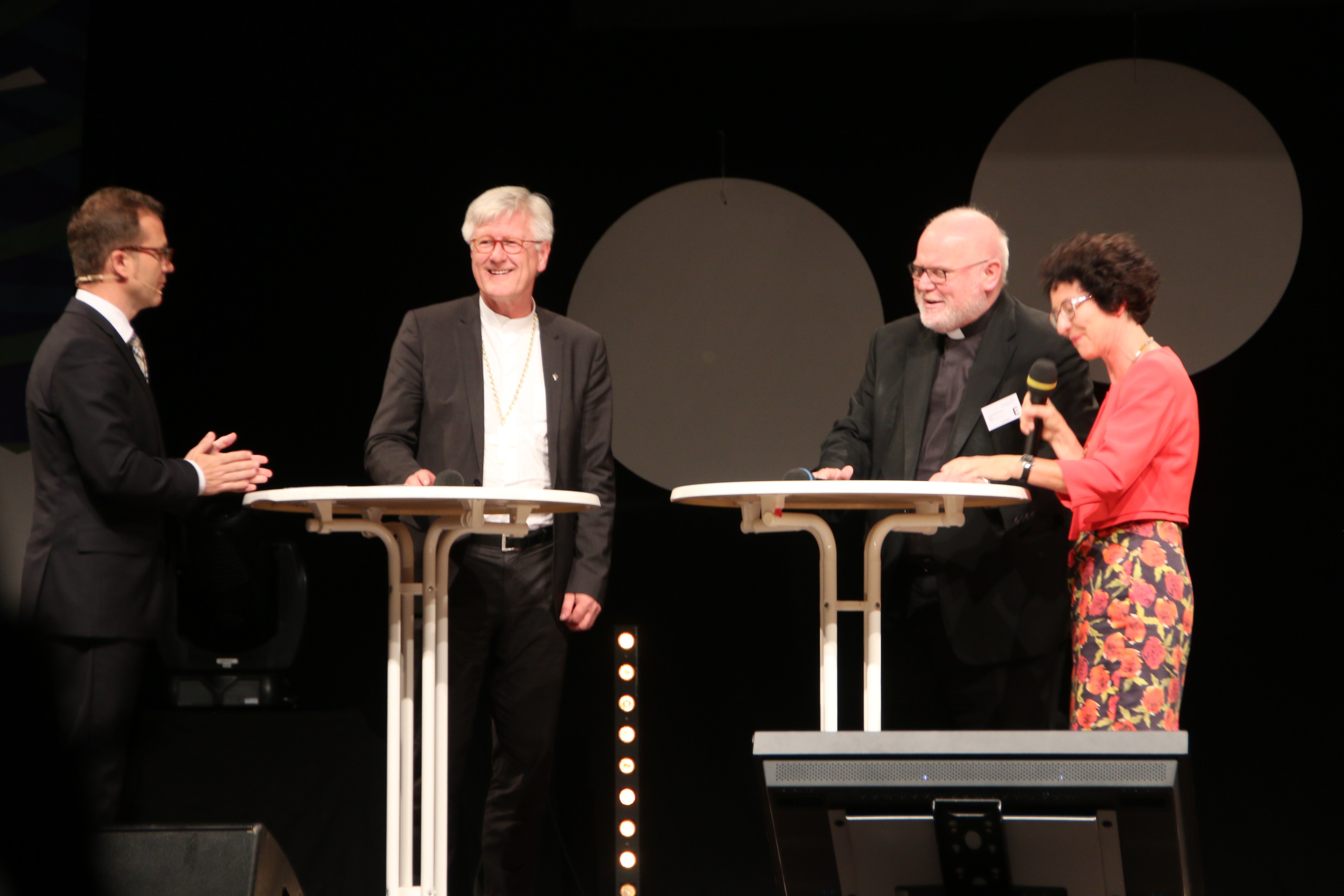
Martin Wagner, CVJM München and Gabriele Deutschmann, CVJM Esslingen interview evangelical-lutheran bishop Heinrich Bedford-Strohm, and Card.Reinhard Marx (C) T4E, Foto: Haaf
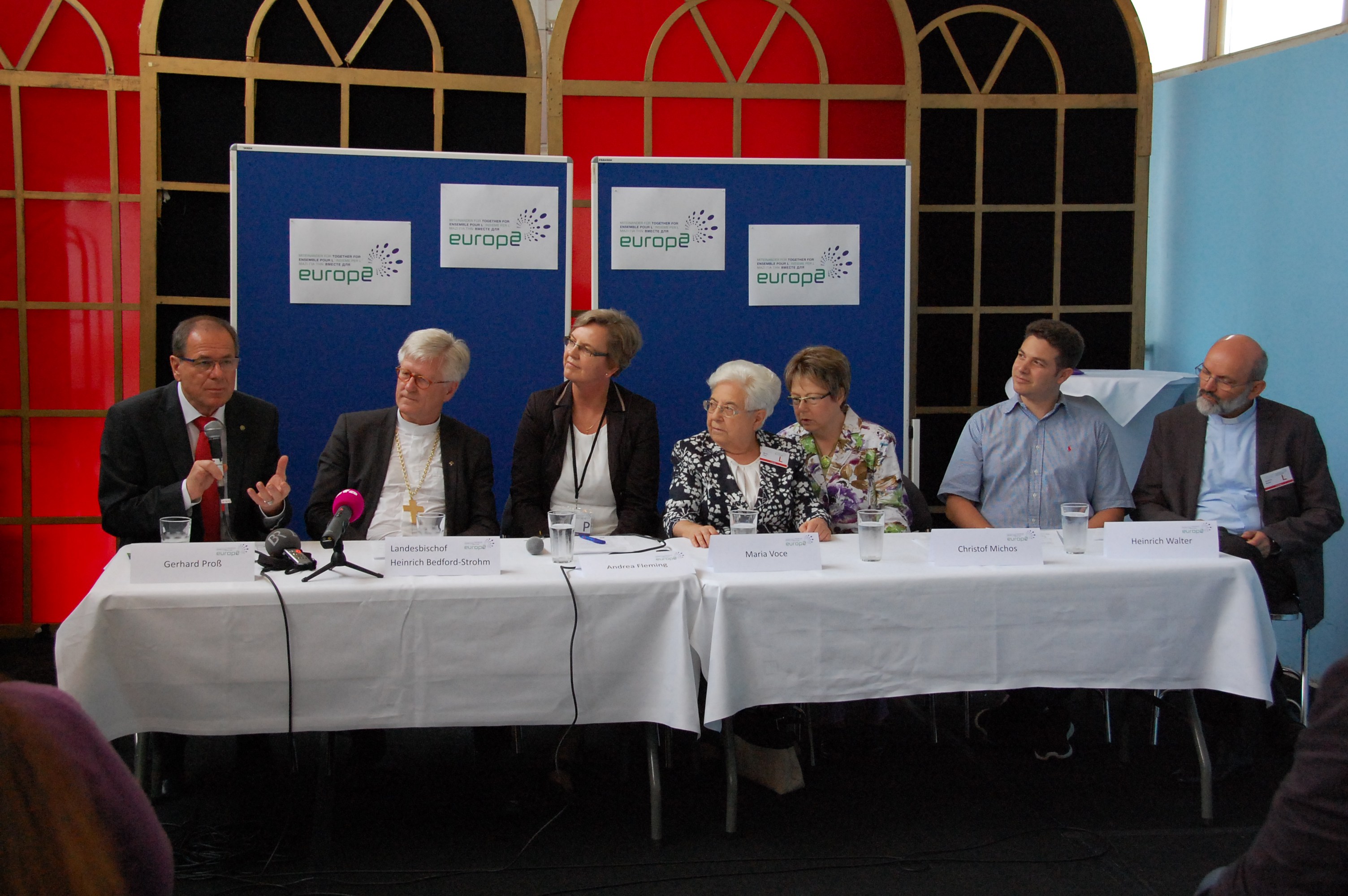
Press Conferenze, June, 30
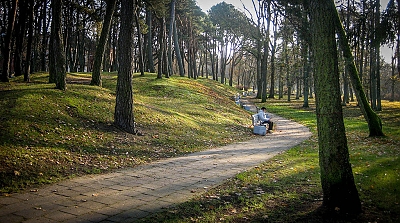
Jun 30, 2016 | Non categorizzato
 “Urged by the stances of our leaders – remember, for example, the establishment of the Day of Prayer for the Protection of Creation (Patriarch Demetrio, 1989), the Evangelical Climate Initiative (2006) and the encyclical Laudato Si’ (Pope Francis, 2015); In recognition of the debt that we, the people of ancient Christian tradition, have contracted with the poor of the Earth and future generations due to the pollution of the Biosphere, mainly caused by our irresponsible progress in the recent past centuries; Aware that the alarm for climate change may become an opportunity for a novel integral development of all people; We Christians, open to the contribution of all people regardless of their beliefs, commit ourselves in prayer and action to avoid the destruction of nature and a new world war, and endorse the following ten challenges:
“Urged by the stances of our leaders – remember, for example, the establishment of the Day of Prayer for the Protection of Creation (Patriarch Demetrio, 1989), the Evangelical Climate Initiative (2006) and the encyclical Laudato Si’ (Pope Francis, 2015); In recognition of the debt that we, the people of ancient Christian tradition, have contracted with the poor of the Earth and future generations due to the pollution of the Biosphere, mainly caused by our irresponsible progress in the recent past centuries; Aware that the alarm for climate change may become an opportunity for a novel integral development of all people; We Christians, open to the contribution of all people regardless of their beliefs, commit ourselves in prayer and action to avoid the destruction of nature and a new world war, and endorse the following ten challenges:
- To convert in projects of peace the weapons disseminated around us, especially the atomic ones
- To increase research in the Biosphere science and its applications, so that they can become safer
- To differentiate and recycle household and industrial waste
- To intensify the use of renewable energy sources
- To plan reforestation programs and forest policies at all levels (from local to international)
- To strengthen ecological transports, such as electric and hydrogen based cars, and local public transport initiatives
- To increasingly allocate hydrocarbons to the production of substances and materials useful for humanity rather than using them for burning
- To avoid the waste of precious common goods such as water and food, ensuring a more equitable distribution
- To respect other living beings, recognizing that everything is in relation in the planet
- To transform our homes, our neighbourhoods and cities into places of beauty, harmony and fraternity
How?
- Adhering to our leaders’ stances and promoting complying laws, such as the Paris Agreement
- Promoting initiatives in accordance with the “Golden Rule” and joining the initiatives of other people, regardless of their belief
- Asking for advice to our communities and cooperating with them in promoting actions to save nature and humanity
We can achieve these goals if we start now, before it is too late. In particular, we can help ensure that greenhouse gases do not exceed the safety levels, as foreseen by the Paris Agreement and recommended by the scientific community.” EcoOne (www.ecoone.org/) Civiltà dell’amore (www.civiltadellamore.org/)
Jun 29, 2016 | Focolare Worldwide
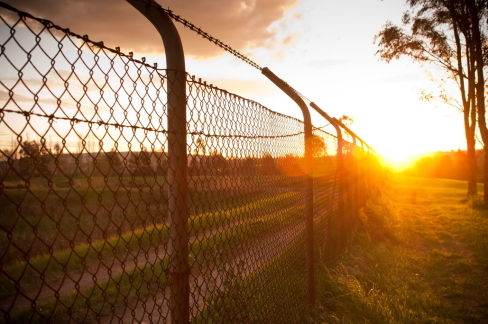
Jun 28, 2016 | Focolare Worldwide
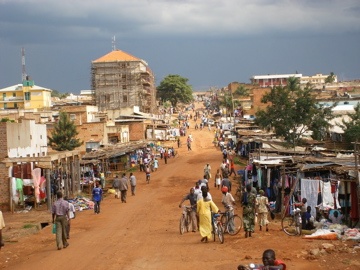 Gulu in northern Uganda is now the second largest city of the country. Many immigrants and Ugandans have moved there to school and find work. Among them is Gloria Mukambonera who works in the computer field. When she arrived in 2013, she contacted the local Focolare community so that she could share her Gospel ideal of peace and unity with others. “I found a real family here” she recounts, “in which I could share my joys and sorrows. We also practice a communion of goods, following the example of the first Chrisitan communities, each person in their own way. The proceeds are used to help people in need and to care for the sick members of the community.” It is an experience that helps you to see the needs of those around you, which are many because of the war. “One day,” says Gloria, “a priest had asked us to visit the people in a parish that was 4 hours away, because – he told us – there was a conflict between tribes and we might be able to help them reconcile. He had suggested that we tell them about how we try to live the Gospel and of our experiences of peace and unity that flow from that. In particular we shared our experiences of forgiveness, of how we were helped to overcome the divisions among us by living the ‘art of loving’ that is found in the Gospel. There was quite a special meeting with all the young people of the place. We read the Word of Life and shared with them our experiences of trying to live it, and then we invited them to share. There was singing, games and mini theatrical performances. . . The dialogue that followed uncovered their desire to begin living in reconciliation with one another.” It was an opportunity to be “peacebuilders” as the bishop had invited us to be. For us it was a matter of “choosing the Gospel’s way of love for the reconstruction of the country, following the destruction caused by years of war.”
Gulu in northern Uganda is now the second largest city of the country. Many immigrants and Ugandans have moved there to school and find work. Among them is Gloria Mukambonera who works in the computer field. When she arrived in 2013, she contacted the local Focolare community so that she could share her Gospel ideal of peace and unity with others. “I found a real family here” she recounts, “in which I could share my joys and sorrows. We also practice a communion of goods, following the example of the first Chrisitan communities, each person in their own way. The proceeds are used to help people in need and to care for the sick members of the community.” It is an experience that helps you to see the needs of those around you, which are many because of the war. “One day,” says Gloria, “a priest had asked us to visit the people in a parish that was 4 hours away, because – he told us – there was a conflict between tribes and we might be able to help them reconcile. He had suggested that we tell them about how we try to live the Gospel and of our experiences of peace and unity that flow from that. In particular we shared our experiences of forgiveness, of how we were helped to overcome the divisions among us by living the ‘art of loving’ that is found in the Gospel. There was quite a special meeting with all the young people of the place. We read the Word of Life and shared with them our experiences of trying to live it, and then we invited them to share. There was singing, games and mini theatrical performances. . . The dialogue that followed uncovered their desire to begin living in reconciliation with one another.” It was an opportunity to be “peacebuilders” as the bishop had invited us to be. For us it was a matter of “choosing the Gospel’s way of love for the reconstruction of the country, following the destruction caused by years of war.”  Ibanda lives in Uganda’s Western Region. There is also a Focolare group there, and they strive to transform the environment around them by transforming themselves, beginning from a jail. “Our outlook and behaviour have changed radically, especially the negative view we had of the inmates,” says Sara Matziko. “The Gospel sentence: “In everything do to others as you would have them do to you” (Mt 7:12) has encouraged us to visit them and pray with them. We discovered that many of them had not received the sacraments for years. The priest from our community went with us to offer this service.” The inmates’ relatives gradually overcame their indifference, we became friends and they went with us to visit the inmates. During one of those visits I met a young man named Ambrose who, after his jail time, wanted to continue his studies. “We helped him to finish high school,” Sara recounts. “Living the Word of Life with one another improved the relationship among us and within the community. The pastor has also joined us in this process that we try to share with other parish communities. Several people from our group attended the international Economy of Communion (EoC) meeting that was held in Kenya, at Mariapolis Piero, May 2015. That helped us to carry ahead our current project.”
Ibanda lives in Uganda’s Western Region. There is also a Focolare group there, and they strive to transform the environment around them by transforming themselves, beginning from a jail. “Our outlook and behaviour have changed radically, especially the negative view we had of the inmates,” says Sara Matziko. “The Gospel sentence: “In everything do to others as you would have them do to you” (Mt 7:12) has encouraged us to visit them and pray with them. We discovered that many of them had not received the sacraments for years. The priest from our community went with us to offer this service.” The inmates’ relatives gradually overcame their indifference, we became friends and they went with us to visit the inmates. During one of those visits I met a young man named Ambrose who, after his jail time, wanted to continue his studies. “We helped him to finish high school,” Sara recounts. “Living the Word of Life with one another improved the relationship among us and within the community. The pastor has also joined us in this process that we try to share with other parish communities. Several people from our group attended the international Economy of Communion (EoC) meeting that was held in Kenya, at Mariapolis Piero, May 2015. That helped us to carry ahead our current project.”
Jun 28, 2016 | Non categorizzato, Word of
World of Life audio mp3 Giving an amnesty to one another, forgiving one another totally and each day, we can grow in the kindness that mirrors God’s mercy to us. There is nothing more wonderful than hearing someone say to you: ‘I love you.’ When someone loves us we don’t feel alone, we walk secure, we are able also to face difficulties and critical situations. If then our being loved becomes mutual, hope and trust are reinforced, and we feel protected. We all know that children, to grow well, need to be surrounded by an environment that is full of love, and to have someone who loves them. But this is true at any age. For this reason the Word of Life invites us to be ‘kind’ to one another, which is to say to love one another, and it gives God himself as a model. It is precisely his example that reminds us that loving one another is not mere sentiment. It is an extremely concrete and demanding ‘desire for the good of the other’. In Jesus God has come close to the sick and the poor, has felt compassion for the crowds, has had mercy on sinners, and has forgiven those who crucified him. For us, too, wanting the good of others means listening to them, showing them sincere attention, sharing their joys and trials, taking care of them, walking with them along their way. The other person is never a stranger, but a brother or sister who belongs to me, who I wish to serve. The exact opposite of what happens when we see others as rivals, competitors, enemies, to the point of wanting their harm, to the point of crushing them, even eliminating them, as sadly we are told in the news happens day by day. Even though we may not go so far, don’t we also accumulate grudges, distrust, hostility or simple indifference towards persons who have hurt us or who we find unpleasant or who do not belong to our social circle? Wanting the good of one another, the Word of Life teaches us, means following the path of mercy, ready to forgive one another every time we slip up. Talking of this, Chiara Lubich tells us about the experience at the beginning of her new Christian community. In order to put Jesus’s command into practice, she and her first companions made a pact of mutual love. And yet, despite this, ‘especially in the early times it was not always easy for a group of girls to live the love radically. We were people like anyone else, even if we were sustained by a special gift of God and, among us, on our relationships, dust could gather and unity could weaken. This is what happened, for example, when we realized the shortcomings, the imperfections, of the others and we judged them, so that the current of mutual love grew cold. ‘In reaction to this situation one day we thought would make pact among us that we called the “pact of mercy”. We decided every morning to see each neighbour we met – in our focolare house, at school, at work and so on – as new, as really new, without remembering at all the other’s flaws, the other’s defects, but covering everything with love. It was a matter of meeting everyone with this complete amnesty in our hearts, with this universal pardon. It was a powerful commitment, taken by all of us together, that helped us always to be the first in loving in imitation of God who is merciful, who forgives and forgets.1 A pact of mercy! Could not this be a way of growing in kindness? Fabio Ciardi 1 Love of neighbour, Talk given to Muslim friends, Castel Gandolfo, 1 November 2002.
![[:it]Insieme per l’Europa: l’unità è possibile[:de]Einheit ist möglich![:es]Juntos por Europa: la unidad es posible[:fr]Ensemble pour l’Europe : L’unité est possible[:pt]Juntos pela Europa: A unidade é possível](https://www.focolare.org/wp-content/uploads/2016/07/20160701_161752_9438MfE_Fr_Podium5_FotoFischer-e1467623076552.jpg)















 Gulu in northern Uganda is now the second largest city of the country. Many immigrants and Ugandans have moved there to school and find work. Among them is Gloria Mukambonera who works in the computer field. When she arrived in 2013, she contacted the local Focolare community so that she could share her Gospel ideal of peace and unity with others. “I found a real family here” she recounts, “in which I could share my joys and sorrows. We also practice a communion of goods, following the example of the first Chrisitan communities, each person in their own way. The proceeds are used to help people in need and to care for the sick members of the community.” It is an experience that helps you to see the needs of those around you, which are many because of the war. “One day,” says Gloria, “a priest had asked us to visit the people in a parish that was 4 hours away, because – he told us – there was a conflict between tribes and we might be able to help them reconcile. He had suggested that we tell them about how we try to live the Gospel and of our experiences of peace and unity that flow from that. In particular we shared our experiences of forgiveness, of how we were helped to overcome the divisions among us by living the ‘art of loving’ that is found in the Gospel. There was quite a special meeting with all the young people of the place. We read the Word of Life and shared with them our experiences of trying to live it, and then we invited them to share. There was singing, games and mini theatrical performances. . . The dialogue that followed uncovered their desire to begin living in reconciliation with one another.” It was an opportunity to be “peacebuilders” as the bishop had invited us to be. For us it was a matter of “choosing the Gospel’s way of love for the reconstruction of the country, following the destruction caused by years of war.”
Gulu in northern Uganda is now the second largest city of the country. Many immigrants and Ugandans have moved there to school and find work. Among them is Gloria Mukambonera who works in the computer field. When she arrived in 2013, she contacted the local Focolare community so that she could share her Gospel ideal of peace and unity with others. “I found a real family here” she recounts, “in which I could share my joys and sorrows. We also practice a communion of goods, following the example of the first Chrisitan communities, each person in their own way. The proceeds are used to help people in need and to care for the sick members of the community.” It is an experience that helps you to see the needs of those around you, which are many because of the war. “One day,” says Gloria, “a priest had asked us to visit the people in a parish that was 4 hours away, because – he told us – there was a conflict between tribes and we might be able to help them reconcile. He had suggested that we tell them about how we try to live the Gospel and of our experiences of peace and unity that flow from that. In particular we shared our experiences of forgiveness, of how we were helped to overcome the divisions among us by living the ‘art of loving’ that is found in the Gospel. There was quite a special meeting with all the young people of the place. We read the Word of Life and shared with them our experiences of trying to live it, and then we invited them to share. There was singing, games and mini theatrical performances. . . The dialogue that followed uncovered their desire to begin living in reconciliation with one another.” It was an opportunity to be “peacebuilders” as the bishop had invited us to be. For us it was a matter of “choosing the Gospel’s way of love for the reconstruction of the country, following the destruction caused by years of war.”